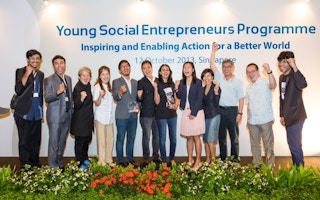Four young teams from Singapore, India and Indonesia were recognised for their social enterprise ideas at the finale of the Young Social Entrepreneurs (YSE) Programme in Singapore on Saturday.
The Singapore International Foundation (SIF), a non-profit organisation for positive change, awarded the winning teams S$40,000 in start-up money to expand their business ventures, which promote sustainable development such as eco-tours and sustainable farming in Indonesia. This funding was channelled to SIF through apVentures, a Singapore-based venture philanthropy group.
SIF, which has helped about 200 international young entrepreneurs since 2010, conducted the ‘Pitching for Change’ business proposal event to close the youth programme they started in March.
From an original line-up of 37 teams, 13 teams composed of 26 aspiring social entrepreneurs from Cambodia, China, India, Indonesia, Malaysia, Nepal, Singapore and Thailand were mentored and trained in business clinics and an overseas trip to Thailand over the course of eight months.
The four winning teams which emerged from these 13 groups are: Dorsal Effect and Gazaab from Singapore, Social Cops from India, and Youth Agri-Socio Entrepreneurs from Indonesia.
“
I believe that today’s youth are a generation driven by purpose — they want to make a change and when they set a goal, they will work towards that purpose
Elim Chew, SIF governor
Singaporean Kathy Xu is behind Dorsal Effect, a start-up providing one-day eco-excursions in Lombok, Indonesia to travellers who want to see sharks. Although shark sightings are not guaranteed, the up-and-coming business ensures that former shark fishermen have a sustainable livelihood.
This conservation campaign protects the apex predators and helps maintain a healthy and thriving marine ecosystem, said the Dorsal Effect.
It also builds on the on-going ‘I’m FINished with FINS’ awareness and education campaign on shark fin soup in Singapore, Hong Kong and Taiwan that aims to reduce the consumption of this Chinese delicacy, which contributes to the millions of shark killings each year.
Gazaab, the other Singaporean social enterprise, is led by Jamon Mok and Nepali Akash Gunung. They empower the poor in Nepal and other developing countries through livelihood and business courses that also connect them with tourists who may want to buy traditional crafts or have a hands-on making experience. At the same time, they provide equity investment through a business competition programme, plus consultancy services to other organisations that may want to do their own corporate social responsibility (CSR) programmes.
At the start of the YSE programme, the founders were having cash flow issues but the training they received addressed the financial problem.
They said, “Right from the beginning, the judges told us that was a shortcoming. Six months later, we’ve incorporated synergistic tools by ‘bundling’ causes as a combined social cause — this made it more appealing to tourists to support the beneficiaries.”
Meanwhile, Social Cops, created by the Indian team of Prukulpa Sankar, Varun Banka and Jahagirdar Kavya Narayan, is a web and mobile platform that helps residents, city councils, non-government organisations (NGOs) and the private sector to come together and solve community issues.
It essentially turns concerned citizens into ‘cops’, allowing them to police issues that partner organisations have linked with the platform through crowdsourcing data and gamification, or the use of game features to incentivize participation with points and vouchers.
For example, Social Cops worked with community stakeholder Let’s Do it Delhi to increase the waste pickup efficiency in Delhi. Locals submitted citizen reports via mobile messages whether garbage was collected or not from their garbage bins.
Initially, the designated third-party collectors reported 100 per cent pickup but with the use of Social Cops on the first month it was discovered that there was only 26 per cent waste collection efficiency. This eventually jumped to 98 per cent by the third month and remained above 98 per cent for the following six months.
According to the team, this increased efficiency was because of “the simple accountability measure brought about by the citizen checkpoint system”.
The fourth champion group is the Youth Agri-Socio Entrepreneurs, led by Alfi Irfan and Rayseed Hussen. They plan to match undergraduate agricultural students with farming communities to maximise productivity and pass on sustainable farming techniques.
They also intend to help brand the local communities or make them identifiable by developing and marketing an agricultural product like an organic drink.
Irfan said: “The YSE network gave us invaluable access to learn from other youth social entrepreneurs. We learnt the value of crunching the right numbers and how to market our product, specific to Indonesia.”
Elim Chew, SIF governor, said, “I believe that today’s youth are a generation driven by purpose — they want to make a change and when they set a goal, they will work towards that purpose.”
The funding money the winners received will help them realise their ideas for social change, she added.

















